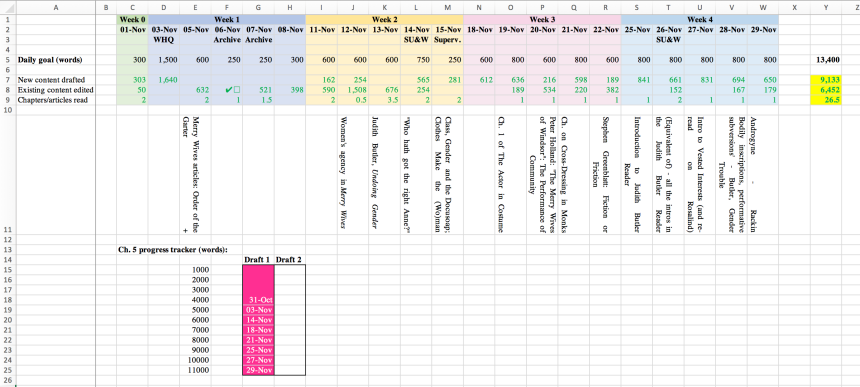*Post written on 30 November; publication delayed in observation of the UCU strike digital picket.*
Academic Writing Month is officially over!
At the end of my last post, I set out my plan to make some serious progress in November. I made a spreadsheet with intimidating daily writing targets and challenged myself to get to a full rough thesis chapter draft by the end of the month.
And…
I did it!!

Though it sometimes felt like I was getting nowhere and writing rubbish for the sake of writing, I now have a Word doc containing 11,493 words of chapter content. The big ideas are all there in roughly the right order. Some parts are flowing prose that can go directly into the final draft, others are in choppy note form with random bits in bold and far too many exclamation marks (ah, caffeine…).
Most importantly, the content I’ve produced has a beginning, a middle, and an end. I can see the overall shape of the story I’m telling and how I can break it down into individual points. That counts as a rough full draft, for me!
I now have 3 weeks to go from the top and edit it all into a full final chapter draft. When that’s done, I’ll have a FULL THESIS DRAFT and big plans to eat a celebratory mountain of cheese over the holidays.
*Crosses all fingers and toes, touches wood, etc. etc.*
Here are a few things I learnt from my experience of #AcWriMo:
- Spreadsheets are powerful things. I will go to great lengths to squeeze out more words if it means I can put a big tick in that day’s word count box.
- However, I don’t usually produce my best work when my daily goal is to reach a particular word count. I’m much more likely to spout rubbish/tangential content in a bid to finish early and do other things. Occasionally this led me to ideas that I might not’ve had otherwise, but mostly it resulted in hundreds (possibly thousands) of words that will just be straight-up deleted in the next draft. Moving forward, I’m going to carry on using a spreadsheet to track my daily editing/writing word count, but I won’t be setting specific word goals. Daily targets like ‘Finish drafting paragraph on X and paragraph on Y’ work much better for me.
- Teaming up with with other writers was really great for staying motivated. Writing can be lonely, but regularly checking in with people in similar boats made the experience feel more like a team effort.
- Taking time out to rest was SO IMPORTANT. #AcWriMo felt a bit like trying to sprint a marathon, but having some serious R+R every evening and weekend really helped. (We’re talking Netflix [especially The Crown], great fiction, long walks in the woods, cooking and baking sessions, podcast binges, meet-ups with friends, etc.)
- Finally, celebrating the small wins felt more essential than ever. Treating every ounce of progress and self care as a great success – no matter how rubbish my writing seemed, or how disillusioned I felt about how the chapter was shaping up – kept me moving forward. Every day was an achievement, and I’m going to try to keep that mindset in place for my final few months of editing.

